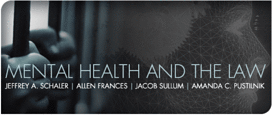I am saddened by Professor Schaler’s ad hominem attack because it bypasses opportunities for substantive engagement. I am particularly perplexed at his objection to my proposal that released offenders should face less administrative burden in satisfying their conditions of parole and continuing their health care, since the complexity of this system leads to much innocent failure and re-incarceration. Should there be more administrative burden?
For the benefit of the readers, I will summarize my position as clearly as possible:
- The claim that state psychiatry is a vast coercive apparatus, which was the premise of Professor Schaler’s original essay, is empirically false. Please review the statistics about the relative size of state psychiatry. Holding aside the issue of whether one credits the reality of mental illnesses, the major place in which citizens experience state coercion is not in our small and shrinking psychiatric hospital systems but in our vast prison systems. The convicted wind up in prisons without the involvement of psychiatrists or psychiatry in more than ninety-nine percent of cases. That’s not hyperbole; fewer than about half of one percent of criminal matters involve a defense of insanity.
- People who are concerned about liberty and self-fashioning, as Jacob Sullum suggests in his fine piece, should concern themselves with the carceral and drug sentencing policies of our state and federal governments—not with the imagined foe of coercive state psychiatry. Those who are particularly concerned about the liberty interests of people with mental illnesses may wish to work to enhance access to voluntary treatment so that fewer mentally ill people wind up in the prison system as a hospital of last resort.
- While state coercive psychiatry is a myth, mental illness is not. By now, Professors Frances, Jaffe, and Pies have written more substantively and eloquently on this issue than I can. Severe mental illnesses and their symptoms, like psychosis, hallucinations, mania, and fugue states, are biologically real entities that arise from organic dysfunction—just as memory disorders like Alzheimer’s, learning disorders like dyslexia, and developmental disorders like autism arise from biological dysfunction.
- This is not an article of faith, except insofar as I place more faith in a position supported by great volumes of empirical evidence and hundreds of thousands of person-years of clinicians’ experiences than in Professor Schaler’s position, which is supported mostly by hollering.
- Many of the most important and well-studied medical disorders are not found in a “textbook on pathology.” Professor Schaler’s contention that schizophrenia must not be real because he can’t find it in a pathology text book is a trivially false objection, as I’m not the first even in this particular debate to point out. Some infectious diseases like flu arise from a single pathogen; most don’t. Some genetic diseases like sickle cell anemia arise from a single type of cellular malformation; most don’t. Even back pain and migraine, two of the most frequent causes of disability and pain in people’s lives, have no single pathophysiology.
- That serious mental disorders have a biological basis does not mean people should be treated in a reductively biological way. As human beings, we constantly make meaning out of our experiences. The ways in which we make meanings feed back into and shape our experiences—and even to some extent shape our bodies and brains.
- There certainly are problems with the current state of the art in defining and treating mental disorders. Like all human institutions, psychiatry is not perfect. Currently there is poor inter-rater consensus on diagnosis and treatment. Finding a treatment that works is often hit-or-miss. Evidence-based medicine must make greater inroads in psychiatric treatment, as it must in other areas of medical practice.
- Commercial incentives, which lead to innovation in drug development, also can lead companies to unjustifiably expand the definitions of mental disorders: The more types of ordinary human misery that can be defined as disease states, the more pills can be sold. This is a danger, but it is not a danger unique to the mental health field. Clever commercializers have defined many aspects of daily life as “problems” that, by amazing coincidence, their products can fix. This requires vigilance against false advertising, not a rejection of the field.
- How does all of this relate to the law? That’s both a big and a small question. It’s a big question because mental illness prompts us to think about free will and the uncomfortable possibility that, even in mentally typical people, chemistry is at work behind the scenes when we think we’re being free choosing agents. And what’s a bigger question than that? But it’s also a small question because, in practice, mental illness plays almost no role in the law—and particularly plays a vanishingly small role in the criminal law. The much-debated, much-maligned insanity defense is a big deal only in scholarly circles and in the popular imagination. Where it is emphatically not a big deal is in courtrooms. There are a couple of insanity acquittals (people found not guilty by reason of insanity) per year—nationwide. It is the idea that we actually have a viable defense called “insanity” anymore that is the true legal fiction, not mental illness itself. Currently, legal constructs of insanity neither materially undermine nor materially support norms of personal responsibility because the insanity defense is a statistical irrelevancy.
- Professor Schaler asked where I stand. I’ll repeat it again: People with mental illnesses should be able to find reasonably accessible voluntary treatment. Treatment does work—but due to funding shifts over the last several decades, treatment for severe mental illnesses in the United States is mostly provided in and through the prison system, even for children and adolescents. This is a terrible human, social, and financial cost. People who care about liberty should care about re-locating opportunities for treatment from prisons and jails and back into non-restrictive community environments.

